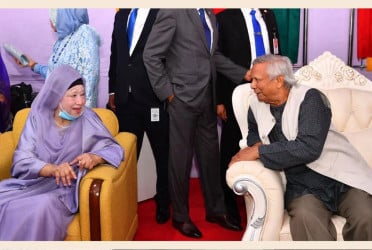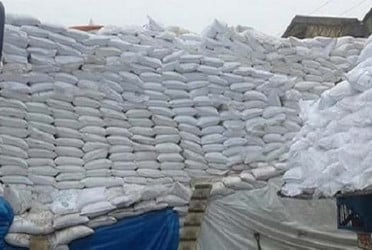The country's export revenue is showing signs of trouble, with three consecutive months of decline.
The latest December report has also had a negative impact. According to the Export Development Bureau-EPB, merchandise exports in the just-ended December amounted to USD 5.3 billion, which is about 1 percent less than the same period of the previous year.
Exports earned in December 2022 were USD 536 million. The biggest fear is that the government has adopted the target of growth in export earnings based on ready-made garments, negative effects are being observed in that sector in December. On a month-on-month basis, positive growth continued in the ready-made garment sector despite a deceleration in export earnings.
However, in the recently concluded December, it is seen that the exports of oven garments also decreased by 4.12 percent compared to the same period of the previous year. Apart from this, exports declined in potential products like caps, furniture, carpets, bicycles, shoes, home textiles, terry towels, ships and raw jute.
Not only that the product-based export income is decreasing, but the income of the major export destinations of the country is also decreasing. Exports of Bangladesh products to the US, the largest destination, have collapsed. In July-November of the current financial year, 3 thousand 640 million dollars worth of products have been exported in five months. This is 9.2 percent less than the same period last fiscal year.
During the July-November quarter of 2022-23 financial year, 4 thousand 9 million dollars worth of goods were exported. It appears that exports have decreased by about 369 million dollars in the five months of the current financial year compared to last time. In local currency, exports to the United States decreased by about 40 thousand 774 crore taka.
About 17 percent of Bangladesh's total product export income comes from the United States. As a result, the decrease in product exports to this largest destination is spreading concern among the stakeholders. Exports also fell to major EU destinations Germany, Italy and Belgium. The decline in exports from major markets has had an impact on the country's overall export earnings.
Commerce Ministry officials say that after the Ukraine war, the Palestinian crisis in the Middle East has created new uncertainty in the global economy. At the same time as the hartal-blockade called by BNP around the national election, the incident of labor movement over wage hike in the labor sector has had a negative impact on the export sector. Garment owners also shut down several garment factories during the discussion period. All these have affected the overall export sector.
Those concerned said that the first three months of the current financial year, i.e. from July to September, there was a positive growth in export income; The negative impact started coming in October. Exports of goods worth $3.76 billion were recorded in that month, which was about 14 percent less than the same period of the previous year.
Talking to Bangladesh Pratidin, Faruque Hassan, president of BGMEA said that garment exports can be increased if harassment in various areas of export is reduced. Apparel exports have been declining for a long time. It is not only in Bangladesh, but globally it has affected the decrease in purchase orders.
“If we were less harassed by Customs, Bonds, VAT, then maybe we could export a little better. Global orders are down, we have tried to do well. But gas prices have risen, supply has dwindled. This has affected the clothing sector.”
“We have already said that garment exports have already had a negative impact. Despite that, we have tried to increase exports. Could have done better if the gas supply was normal. At the same time, if we were less harassed by customs, bonds, VAT, then we could do better,’ he said.
“The year 2023 has brought us many challenges. Supply of electricity fuel was not normal, interest rate increased a lot. All in all, last year was very difficult,” Faruque Hassan added.
Professor Dr Mustafizur Rahman, Executive Director, CPD said, “The import demand of the countries we export to has contracted. Along with this, the July-December quarter saw less revenue than the strategic target. This is reflected in the December export earnings report.”
“Exporters get some benefits when the rupee depreciates against the dollar. As a result of devaluation of money, traders are able to take that opportunity; Despite this, the decline in export earnings is worrying.”
“The garment sector is the lifeblood of the country's export sector. The decrease in income in this sector is alarming. However, instead of depending on one product, attention should be given to increasing the export of non-ready-made alternative products,” he said.
“84-85 percent of the country's income is dependent on ready-made garments. The reason for the decrease in income in this sector is the contraction of import demand in European countries including the United States. Due to economic instability and inflation in these countries, the demand for clothing has decreased. It happened not only in Bangladesh. Rather, it happened in the case of other exporting countries as well,” Professor Dr Mustafizur said.
Apart from the outside world, the country's political instability is also having a negative impact on the export sector, he said.
Mohammad Hatem. Executive President, Bangladesh Knitwear Manufacturers and Exporters Association (BKMEA) said that foreign buyers are not coming to place export orders due to ongoing political unrest over national elections.
In a telephone interview to Bangladesh Pratidin, he said that the government's export account on paper is much worse than the actual picture. From what we understand from field visits to the factories, the picture is dismal. He pointed out the instability of the external world as well as the internal political uncertainty of the country for this negative situation in the export sector.
“A political party on one side has been conducting continuous strikes and blockades regarding the national elections. Even after the election, we do not have any information that there will be any change in this situation. As a result, these messages are creating negative attitudes among foreign buyers. They are following a slow-walk policy in placing new purchase orders,” Mohammad Hatim said.
The BKMEA leader said that besides the Ukraine war, the Palestine issue has also created great unrest in the Middle East. Due to these reasons, a negative impact was observed in the export sector for the past few months. He also fears that the political uncertainty of the country may prolong this negative effect.
However, he also expressed hope that if the government comes to power through fair elections and handles everything with a firm hand, the negative impact of the export sector will be removed.
(The article was published on print and online versions of The Bangladesh Pratidin on Januray 03, 2024 and has been rewritten in English by Tanvir Raihan)





































































